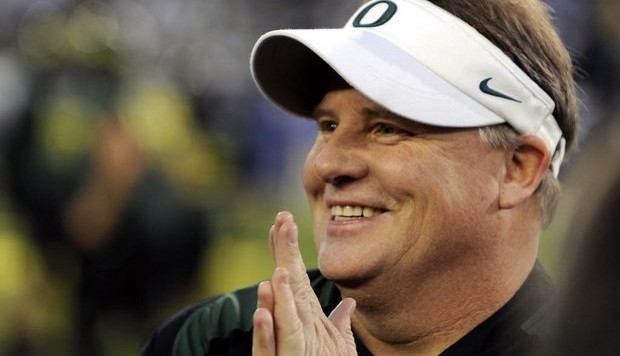Now that the Philadelphia Eagles have officially released Chip Kelly, it’s time to examine what this decision means for college football.
Wait a minute, Johnson, why would an NFL firing send shockwaves through the collegiate ranks?
As a general rule, it should have no impact whatsoever, as the college and the professional game are completely different animals. Football history is loaded with examples of players and coaches who were extremely successful at one level and less than successful (to put it politely) at the other.
Kelly certainly falls into this category. Sure, his 26-21 record was better than those posted by Nick Saban (15-17), Steve Spurrier (12-20), or Butch Davis (24-35) in the professional ranks. However, it became apparent to just about just about everyone that Kelly’s scheme wasn’t going to work in the NFL. Yes, the Eagles led the league in yards per play (6.3) in his first season, but opposing defensive coordinators eventually figured out a way to stop it. That was the case this season, as Philadelphia finished 24th in yards per play (5.2), 26th percentage of drives ending in scores (28.6%), and 28th in turnovers (29).
Those dismal numbers, coupled with the fact that he ruffled a more than few feathers with some of his personnel decisions, makes it highly unlikely that Kelly will be a head coach in the NFL again. Despite posting two 10-win seasons, he’s still relatively unproven, as he failed to lead the Eagles to a playoff win.
On the other hand, every college football program with an opening is going to want Chip Kelly. While his NFL resume needs a little work, his record in the collegiate ranks is as good as anyone not named Urban Meyer or Nick Saban. In four years at Oregon, he guided the Ducks to a 46-7 record with three conference championships. He also led UO to four BCS bowls and a berth in the 2010 season’s BCS National Championship Game.
To put it another way, his Duck teams were more likely to play in a BCS bowl game (four times) than to lose a conference game (three times).
In addition, there’s absolutely no doubt that his offense works at the collegiate level. During his successful tenure at Oregon, the Ducks ranked in the top 10 in total offense in three times, leading the nation in 2010. A model of efficiency, opposing defenses couldn’t stop Kelly’s stellar spread attack, which averaged no fewer than 6.05 yards per play in any of his four seasons as the head coach.
It’s tough to argue with those results, which is why Kelly’s name will come up whenever a team has an opening. I’m sure there are some schools out there – specifically, one in the Palmetto State – that wishes the Eagles would have acted sooner. If they had, he would probably be out on the road recruiting for the South Carolina Gamecocks right now.
Regardless, don’t be surprised to see Kelly back in college football, perhaps as soon as next fall. While it seems somewhat unfathomable that a school would make a move at this point in the season, coaches with a proven track record like Kelly aren’t available very often. His unexpected free agency might cause a program that suffered through a disappointing season to make a move in order to compete for a crystal football next year.
If you presume that another NFL team would pluck Kelly in the coming weeks, you are making the bet that after Kelly’s chaotic tenure in Philadelphia, an NFL organization would not be turned off by the instability and offensive limitations Chip Kelly would bring. It’s patently obvious that Kelly’s offense is perfectly suited to college football. That’s where his next coaching adventure is very likely to take shape.
It’ll be interesting to see how it all unfolds.

